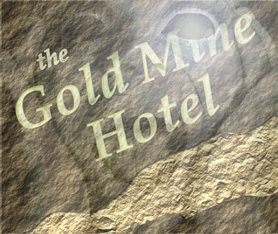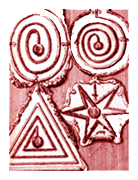



Fiona Joyce was born in Ireland. She and her father came to America in the 1850s, when she was nine years old, just after the death of her mother. Her father found work as a blasting supervisor in the Californian mining community of Park's Bar. After a failed attempt at operating his own brewery, he found himself unemployed and broke.
The prospect of quick riches lured Mr. Joyce to Gold Hill, NV, when gold was discovered at the head of Gold Canyon in 1859. At that time, the Comstock Lode was considered 'The Richest Claim on Earth', and Gold Hill was thriving. The following year Mr. Joyce had a terrible accident in a mine shaft and died before he was able to strike it rich. Fiona was seventeen, alone, and penniless. She secured room and board working as a chambermaid and waitress at Steward Inn.
Steward Inn offered rooms for rent, as well as 'companionship', for the numerous prospectors in the now-thriving (due to the mine) area. Because the entire town was built around the hill where the original mine was discovered, many of the buildings, including the hotel, were actually built over the mines. Alexander Steward, the proprietor, took an instant liking to the young Fiona and endeavored to marry her. In a matter of weeks, Fiona became quite smitten with the charming twenty-six-year-old Alexander, and they were married four months later.
The most promising of Alexander's claims in the Gold Hill area, which had already found tracer gold, struck a large vein the following spring and quickly became the largest gold-producing operation in town. He invested some of the profit in the hotel, constructing an additional wing, so the 'ladies of the house' could conduct business away from the critical eye of the mainstream clientele. He also bought additional claims and a lot of real estate within Gold Hill.
With tremendous wealth at her disposal, Fiona decided to build an estate to rival any in the state of Nevada. At a cost of well over $250,000, the house was completed in the summer of 1864 and furnished with items imported from the most expensive antiques dealers in Europe.
In addition to the two sons Fiona had already borne while living in the hotel quarters, over the next six years, she birthed four more strapping boys. Alexander desired even more children, and twenty-seven-year-old Fiona was desperate for a daughter. But try as she might, her body would not conceive. Alexander became sullen and violently angry over minor issues. Once vibrant and charming, he had turned surly -- even snapping at the children for no apparent cause. He was so obsessed with having another child and creating (what Fiona felt was) a 'Gold Hill Dynasty' that he ferried in specialists from as far away as New York City. He even resorted to local quackery and native charms. His ranting became increasingly unbearable for Fiona. The guilt she felt for not producing another baby (when she knew he wanted one so intensely) weighed heavily on her.
Finally, after almost two-and-a-half years, Fiona became pregnant for the seventh time. Alexander was ecstatic! The frown and look of failure (which Fiona feared was permanent) was replaced by a boyish smile and an inherent knowledge that 'he had spawned life'. He was even more jubilant at the prospect of this child's birth than he had been with any of the others. He threw one of the biggest town celebrations in Gold Hill to date; no expense was spared and drinks were 'on the house'. Although she should have shared his joy, Fiona felt more relief at having the old Alex back than happiness about her pregnancy; she didn't care for the way her husband had changed over the last couple of years.
Fiona's pregnancy advanced without incident. In preparation for the baby's birth, the boys were sent to Virginia City to stay with Alexander's sister. Alexander was more attentive than he had been in years. On July 23rd, 1873, with only the help of her husband, Fiona gave birth to a baby girl at 7:00 pm. The entire process was a relatively short birth, lasting only seven minutes from start to finish, but Fiona had lost a lot of blood and later slipped into a state of semi-consciousness, where she would remain for two full days. Alexander did not call the doctor, and Fiona was unable to ask him to do so.
Alexander was extremely upset by the sex of the baby, and he shut himself up in his study -- with copious amounts of brandy. Fiona would later remember his ravings, seeping through the vapor of her dreams. "How dare she, after all this time, after all this waiting, bear me a daughter! A son! It should have been a son!". Grief and exhaustion overwhelmed her, and she would slip back into that dream world...where there existed no guilt, no pain, and no girl babies to think about. When Fiona finally awakened to the reality surrounding her, she would wish herself dead.
On the second evening after her daughter's birth, Fiona rallied and awoke parched. After calling and calling for her husband, she concluded Alexander was not in the house. As she reached for the bassinet by the bed, a horrible sinking feeling threatened to steal the very breath from her body. The bassinet was empty. Something was wrong, terribly wrong. The absolute faith she had in that feeling drove Fiona, in her weakened state, to get out of bed and scour the house for signs of husband and daughter.
She found Alexander in the study, face-down on his desk. The stench of alcohol clinging to him was almost enough to make Fiona ill. She roused him and asked after the whereabouts of the baby. He didn't look pleased to see her, but with a proper show of husbandly concern, he sat Fiona down and told her the child had died suddenly, the night before. Unsure when Fiona might recover from childbirth, Alexander had quickly and quietly buried his daughter beneath the elm tree on the hill behind the house, and requested his sister keep the boys a while longer, while Fiona adjusted to the loss.
Something in his voice, something in his whole bearing, made Fiona uneasy. She didn't believe Alex's story, and her suspicions (and grief) permeated every facet of her daily life. The couple began sleeping in separate rooms, and barely spoke to one another.
Over the next several weeks Fiona's mental state deteriorated. She was found sleeping next to her daughter's grave, under the elm tree. She claimed to hear the baby's cries every time she closed her eyes -- little whimpering mewls of fear and howling newborn screams for protection. The cries permeated her very being. She would wander the property in search of the source, and always end up under the elm. She dug in the earth beneath the tree, in search of her daughter's body, and found none. Her husband claimed he had buried the child eight feet under. Before Fiona could excavate further, Alexander began disseminating tales of his wife's lunacy to anyone who would listen. He was considering having her committed.
Fiona's actions did seem quite mad to the average person, yet the couple's friends understood them as the actions of a heart-broken young woman. Most felt an asylum was unwarranted and unreasonable, given the circumstances. This common view gave rise to the thought that Alexander, ever-fanatical about his sons, was considering institutionalizing Fiona so he could remarry...and father more children!
Fiona could not stand to be in the same house with her husband; she could not bear to look at him and was repulsed by his mere presence. She despised him for allowing the little girl to slip out of this life without so much as a name. Fiona hated him for burying her daughter without giving her the chance to hold the infant even once. But most of all, she didn't trust Alexander's account of the baby's death. It wasn't enough for Fiona to hear that her daughter had just 'died suddenly'. Why hadn't Alex called the doctor?
Insisting she was not crazy, merely melancholy and in need of a rest, Fiona took up residence in their old apartment at Steward Inn.
Her first night in the hotel was fraught with cries of her baby. The housekeeper found her wandering the hotel in the wee hours of the morning, calling for her infant daughter. Having lost three children herself, the housekeeper knew exactly what the Missus needed. She gave Fiona a dose of laudanum and eased her back to bed, where she slept dreamlessly until morning.
On the second night as Fiona napped fitfully after supper, the evening of September 25, 1873, the cries grew stronger and more demanding, and Fiona sought to follow them again. This time, she made her way to the basement, the baby's wails growing louder as she went. She followed them to the west corner where there was an old mine shaft, a relic of the mined-out vein on which this section of the hotel was built.
As she approached the shaft, through the murkiness of her trance, she heard the Housekeeper's frantic calls to her from the stairs. It didn't matter; her child was all that mattered. The baby's cries were more audible here, more insistent. The child was down the shaft...she knew it with everything inside her soul!
Just as the Housekeeper approached Fiona, speaking calmly in a soothing tone, Fiona propelled herself into the shaft with all the purpose of a mother reunited with her long lost child. At that same moment, all the denizens of the saloon reported experience a bone chattering chill. Some were startled so much by the feeling that they dropped their drinks to the floor.
Some of this account is conjecture; no one can say for sure what Fiona Joyce Steward heard or saw after the death of her baby. Only that which she recounted (in confidence and in grief) to others can be shared. Some people, like Alexander Steward, believe she simply went insane with the loss of her child. Others say that Alexander did indeed want a seventh son more than anything in the world, and that rather than suffer the injustice of begetting a girl child, he murdered his own daughter by throwing her tiny body down the mine shaft in the basement of Steward Inn... where, in the end, her mother joined her. Alex was so relieved to be rid of his wretched wife that the same evening he re-christened the hotel in honor of the way she died, changing the name from Steward Inn to the Gold Mine Hotel.
Every year since, paranormal activities at the Gold Mine Hotel are said to peak on the evening of September 25, at seven in the evening, and lasting for 77 minutes.

Stranger than Fiction Magazine is your premier source for tales of the bizarre and extraordinary. Published quarterly. Established 2004.
Fall 2004 issue (here)
